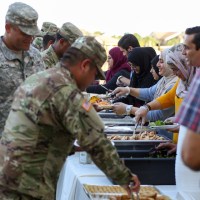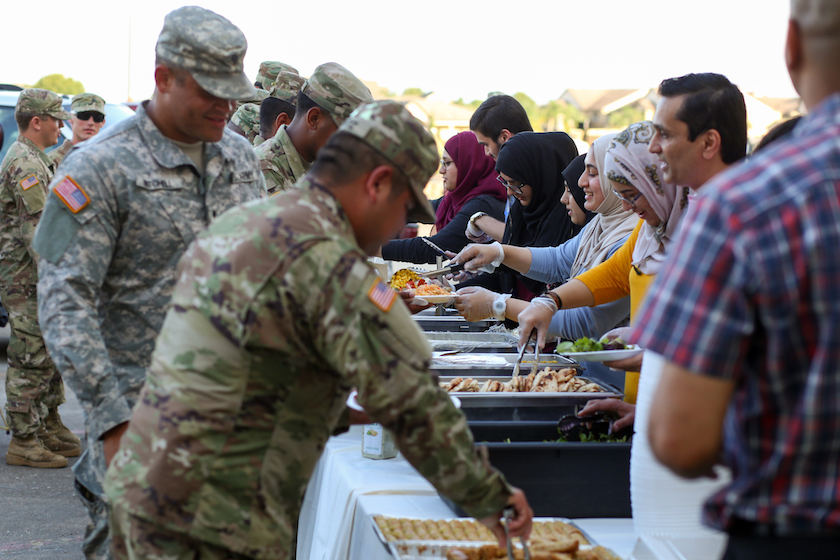Middle Eastern spices waft through the air of a Sears parking lot in Port Arthur, Texas, while a group of Muslim young people serve dinner to a battalion of U.S. Army soldiers. It’s an odd and beautifully upside-down moment.
The soldiers’ plates are piled high with spiced meat, fragrant rice, roasted veggies and homemade pita bread. It’s the first hot meal they’ve had in weeks. And yet, I can’t tell who’s more excited to be there—the people being served, or the ones doing the serving.
The U.S. military set up headquarters in the parking lot of the mall during their response to Hurricane Harvey. Pragmatically, it makes sense, but it also means we’re surrounded by a disorienting mix of humvees, army trucks, and military boats—as well as minivans, department store sale signs, and retail delivery trucks. A helicopter lands outside Target during dinner.

There’s a section of the parking lot filled with pop-up tents and cots where these brave men and women have been sleeping for the last 12 days. Out in the Texas heat. With no privacy. Under the fluorescent lights of the mall parking lot. It’s quite the “bedroom.”

There’s also no kitchen for these soldiers, which means that they’ve had nothing but MREs (Meals Ready to Eat) since they arrived—dehydrated meals that taste almost as good as they sound.

When the leadership of the mosque in nearby Beaumont heard that these service members were living like this, they were horrified. Being the type of people who spring into action whenever they can meet the needs of their community, the Muslim community here picked up the phone and made something happen.
Many families at this mosque came from Middle Eastern countries—places known for their hospitality and their food. And boy did they live up to that reputation in the parking lot of that mall.

As soon as the catering truck pulled up and the spices started floating across the parking lot, uniformed soldiers with tightly cropped hair and tightly laced boots fell into line. Several anxiously checked their watches, hoping to grab food before they had to head out on a mission. They looked terribly disappointed when their commanding officer called them out of line before they got to eat. Fortunately, though, their abrupt departure didn’t go unnoticed by the crew serving food. They set aside several trays of deliciousness and waited around in that parking lot until the group got back—no one was going to miss out on eating their food if they could help it.
Army packs and gratefully unnecessary MREs littered the asphalt around the soldiers as they sat or leaned on whatever random stuff was around—a military vehicle, a stack of pallets left over from Sears’ Labor Day sale, a couple of lawn chairs that seem extraordinarily out of place. And they savored the opportunity to eat food that wasn’t previously dehydrated or made in a factory.

When one dish started to run low, the guy catering the meal (for free) ran over to his van and pulled out another full platter.
“There’s plenty more where that came from!” he assured the crowd. It’s like the Mary Poppins bag of catering trucks. How many trays of food could there possibly be in there?!
Most of these soldiers have done tours in Iraq or Afghanistan, and the ladies dishing up the food are impressed by how many of them know the traditional names of the dishes. Only once did a soldier point to a dish and ask what it was. When he did, Tahir, one of the leaders at the mosque, answered him and then joked that he “must not have done his tour in Iraq yet.” Everyone laughed.

It was funny and awesome, but also… what a weird moment. A Middle Eastern man feeding and joking with the army of his now-country about their time in his home-country? It was surreally backward in the best way possible.
It was also incredibly hopeful. Because let’s be honest, there could easily be a great deal of tension between these two groups. Muslim families from the Middle East and US armed forces have a long history… and much of it is negative.
But in this moment, everyone chose to love anyway. They chose to step forward when others might have stepped back. They chose to love across enemy lines because the truth is that we are not enemies and the lines are all in our heads.

The truth is that in that moment, we were all American. The truth is that we belong to each other. Regardless of whether we’re wearing a hijab, an army-issued cap or a cowboy hat. Regardless of where we worship, what language we speak, or what country issued our passport. We belong to each other.
Never has that been more clear to me than when I watched six smiling Muslim women scoop Middle Eastern food onto the plates of exhausted U.S. soldiers in the parking lot of a Sears outside Houston, TX.
This is peace. And these are the peacemakers.


